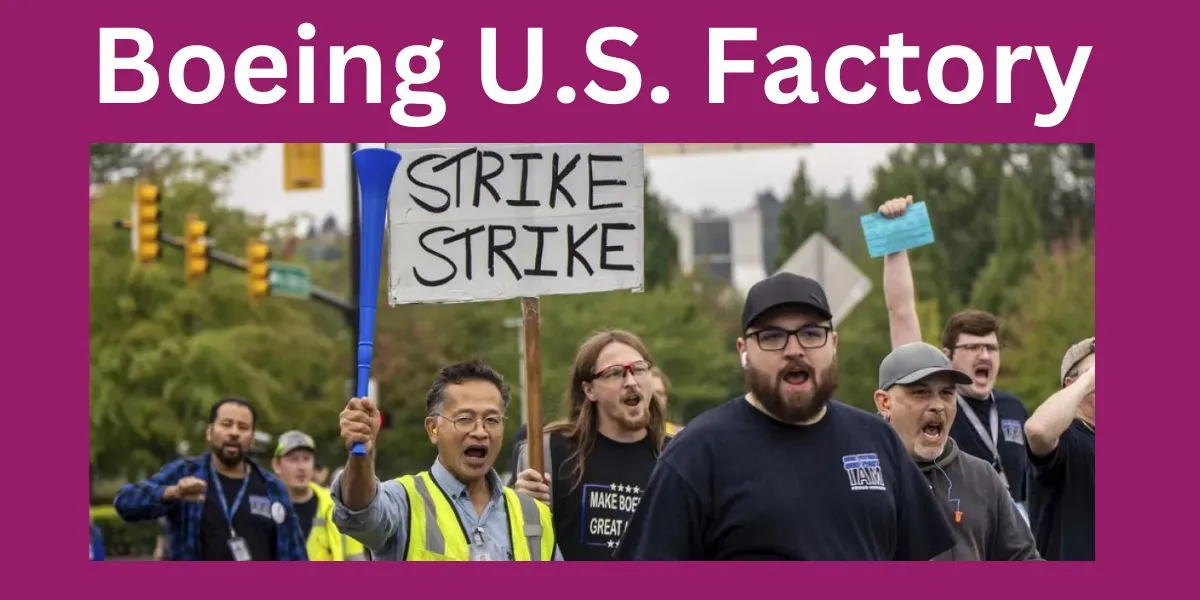When you think about airplanes, there’s a good chance you picture Boeing. They’ve been a powerhouse in the aerospace industry for decades. But right now, things aren’t flying so smoothly in Boeing’s U.S. factories. Thousands of workers have decided to strike, turning down what many would consider a significant pay increase. So, why are Boeing’s employees walking out, even when the company is offering a 25% raise over four years? Let’s dive into what’s really going on.
What Sparked the Boeing Strike?
It’s all about money—well, mostly. Boeing recently offered its factory workers a pay increase of 25% spread out over the next four years. On paper, that seems like a pretty sweet deal, right? After all, how often do you see a quarter of a pay raise over just four years? But it’s not that simple. Workers rejected the offer because they felt it didn’t address all of their concerns.
Sure, the paycheck matters, but there’s more to the story than just dollars and cents.
Beyond the Paycheck: What Do Workers Want?
The strike isn’t just about getting more money into people’s pockets. Boeing’s workers are looking for better benefits, improved working conditions, and, perhaps most importantly, job security. Over the past few years, Boeing has had its fair share of turbulence—from layoffs to production slowdowns—and workers want guarantees that their jobs won’t disappear overnight. It’s hard to feel secure in your position when you’re constantly worried about a potential layoff around the corner.
Job Security Takes Center Stage
One of the biggest issues in these strikes is job security. Workers aren’t just thinking about today; they’re worried about the future. As Boeing navigates its way through challenges like international competition and fluctuating demand for airplanes, employees are concerned their jobs could be on the chopping block. A 25% pay raise isn’t going to mean much if the job itself isn’t guaranteed for the long haul.
The Question of Benefits
Let’s be honest, benefits are a huge part of why people stick with their jobs. And in this case, Boeing’s workers feel the benefits package they’re being offered is just not enough. Healthcare costs have been rising, and workers want their employer to step up and ensure their families are protected. It’s not just about covering their medical needs today but also planning for the future, like retirement and long-term care.
The Role of Unions in the Boeing Strike
You can’t talk about a strike without mentioning unions. Unions are there to protect the rights of workers, and they’ve played a critical role in organizing this strike. Boeing employees, represented by the International Association of Machinists and Aerospace Workers (IAM), are pushing back against what they see as an unfair deal. The union has been vocal about the need for Boeing to address the full scope of workers’ concerns, not just throw money at them and hope the problem goes away.
The Importance of Solidarity
When it comes to strikes, solidarity is key. Boeing’s workers aren’t just striking for themselves; they’re striking for their colleagues, their families, and even for future employees. It’s a collective effort, and the union is working hard to keep everyone united. After all, it’s much easier to negotiate when you have thousands of people standing together rather than just a few individuals.
Negotiations at a Standstill
As of now, negotiations between Boeing and the union seem to be at a standstill. Both sides have dug in their heels, with Boeing insisting that their offer is fair and the union pushing back, demanding more. It’s a bit like a game of chess, with each side waiting for the other to make a move. Unfortunately, the longer this goes on, the more impact it has on both the workers and the company.
How is Boeing Affected by the Strike?
Strikes aren’t just bad news for employees—they’re also a massive headache for the company. Boeing’s production lines are critical to meeting its global orders, and every day of the strike costs them millions of dollars. The company is already dealing with the aftermath of previous production delays, and this strike only adds fuel to the fire.
Delayed Orders and Angry Customers
When Boeing’s workers aren’t building planes, those planes aren’t getting delivered. Airlines and other customers are likely already feeling the pinch of delayed orders, and as the strike drags on, Boeing’s reputation takes a hit. In the world of aerospace, time is money, and every delayed order means Boeing could lose future business to competitors.
The Stock Market’s Reaction
It’s not just Boeing’s factory floors feeling the effects of this strike. Investors are watching closely, and the company’s stock has already taken a dip. When workers strike, it signals instability, and that’s something the stock market doesn’t like. If Boeing can’t resolve this issue soon, the company could face long-term financial repercussions.
The Workers’ Perspective: Why 25% Isn’t Enough
At first glance, it seems surprising that workers would reject a 25% pay increase. But when you break it down, things start to make more sense. Boeing’s employees aren’t just thinking about the next four years—they’re thinking about the big picture. For them, the offer doesn’t address some of the more critical issues they face daily, like job security and benefits.
The Cost of Living Challenge
One thing that can’t be ignored is the rising cost of living. Over the past few years, inflation has skyrocketed, and many workers feel that a 25% increase over four years won’t be enough to keep up with these rising costs. The cost of healthcare, housing, and everyday expenses is increasing much faster than their wages, making it tough for families to make ends meet.
Stagnant Wages in a Changing Economy
It’s not just the cost of living that has workers worried. Many feel their wages have remained stagnant compared to the growing profits Boeing has reported in recent years. The company has continued to thrive, but workers haven’t seen that success reflected in their paychecks or benefits. For them, this strike is a way to fight for a fair share of Boeing’s prosperity.
The Future of the Boeing Strike: What’s Next?
So, what happens now? That’s the million-dollar question. Will Boeing and the union come to an agreement? Will the strike continue to drag on? At this point, it’s hard to say for sure, but one thing is clear: both sides need to come to the table ready to negotiate in good faith.
Possible Resolutions
There are a few potential outcomes here. Boeing could agree to the union’s demands, bringing the strike to a quick end. Alternatively, the company could make a counteroffer, which the union might accept after some back-and-forth negotiations. In the worst-case scenario, the strike could drag on for weeks, or even months, causing significant damage to both the company and its workers.
The Impact on the Aerospace Industry
Boeing isn’t just any company—it’s a key player in the global aerospace industry. A prolonged strike could have ripple effects throughout the entire sector, impacting suppliers, customers, and even Boeing’s competitors. Everyone is watching closely to see how this situation plays out.
Conclusion: Boeing’s Crossroads
Boeing’s U.S. factory workers have sent a clear message: they’re not just fighting for a pay raise; they’re fighting for their future. While the 25% offer might seem generous on the surface, it’s not enough to address their deeper concerns. As the strike continues, Boeing and its employees are at a critical crossroads. Both sides need to find common ground, or they risk facing even bigger challenges down the road.
FAQs
1. Why did Boeing workers reject a 25% pay increase?
Boeing’s workers rejected the 25% pay increase because they felt it didn’t address other important issues, like job security, benefits, and the rising cost of living. While the raise was significant, workers are looking for more comprehensive solutions.
2. How long could the Boeing strike last?
There’s no definite timeline for how long the strike will last. It depends on how quickly Boeing and the union can come to an agreement. If both sides remain at a standstill, the strike could go on for weeks or even months.
3. What role does the union play in the strike?
The union, specifically the International Association of Machinists and Aerospace Workers (IAM), represents Boeing’s workers and is negotiating on their behalf. They are working to ensure that employees get a fair deal, addressing not just pay but other concerns like benefits and job security.
4. How is Boeing being affected by the strike?
The strike is causing delays in Boeing’s production, leading to missed deadlines and frustrated customers. The longer the strike continues, the more financial strain it puts on the company, impacting everything from stock prices to future orders.
5. What do Boeing workers want besides a pay increase?
In addition to a pay increase, Boeing’s workers are demanding better benefits, stronger job security, and assurances that their jobs will be safe in the future. They also want the company to address the rising cost of living and healthcare expenses.









